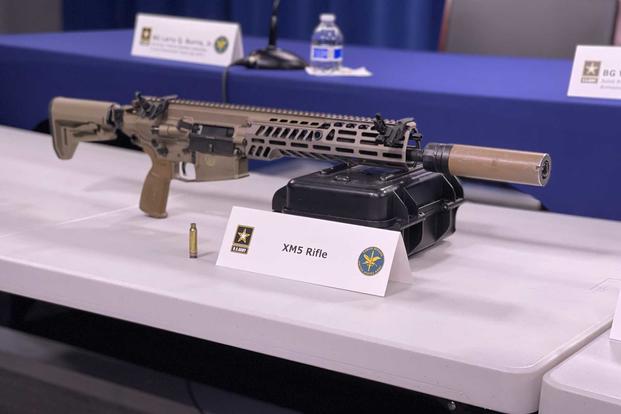Sig Sauer has been picked by the Army to make replacements for the service's aging M4 rifle and M249 Squad Automatic Weapon, but it will likely take nearly a decade for units to start seeing the new weapons. And defense officials are holding many major details close to the chest about the guns that more than a hundred thousand soldiers will haul all over the world.
The new weapons will be the XM5 Rifle, set to replace the M4; and the XM250, which is replacing the SAW. They will be renamed the M5 and M250 as they make their way to their first Army unit near the end of 2023.
Army officials have touted the performance of Sig Sauer's weapons and ammunition, but details are scarce on the most basic metrics of why those weapons would be better for front-line troops.
Read Next: Land Navigation Is Coming Back to the Army's Basic Leader Course
The new weapons are intended to be issued only to front-line troops: infantry, cavalry scouts, combat engineers, medics, forward observers and special operations, Brig. Gen. Larry Burris Jr., director of the Future Soldier Lethality Cross Functional Team, told reporters during a press conference Wednesday.
In all, that is about 121,000 soldiers. The Army is set to buy 107,000 of the new rifles and 13,000 machine guns for those combat-arms troops across the active duty and the National Guard.

But it could be nearly a decade, maybe longer, until all of those troops are issued those fresh weapons. That is mostly due to the Army having to build a new facility to produce the new 6.8mm ammunition. Both the M4 and SAW used 5.56mm, and this will be the first time in more than 60 years the service has transitioned to a new ammunition for its main weapons. Sig Sauer will produce ammunition until the Army can get its own facility working -- expected to happen around 2026 -- to mass-produce the new round.
During the press conference at the Pentagon, it was unclear whether the new ammo could penetrate Level IV body armor, which is a standard-issue protective body armor for U.S. troops and would be expected to be worn by future adversaries, given the Army's refocus to training for conventional warfare.
"I can't get into the specifics of what capability [the ammo will] provide," Burris told reporters. "But it does provide greater energy against protected and non-protected targets. But it's a much greater capability."
Officials also declined to disclose the range at which both weapons can engage targets. The M4, the Army's current standard-issue rifle, can effectively engage targets at 500 meters. The SAW can suppress at roughly 800 meters. Anything less could be a devastating blow to Army combat tactics and capabilities compared to potential adversaries.
Officials also declined to answer Military.com's question about how much each of the weapons weighs. A soldier must be capable of traveling long distances on foot, so even minor additions to the weight they carry can be crushing.
Military.com held each of the weapons. The new rifle weighed considerably more than the M4 without any attachments and appeared much more bulky, raising questions about how easily troops can maneuver their weapons in vehicles and other tight conditions -- such as urban combat. The SAW's replacement was noticeably lighter.
The initial fielding will be small. It's part of Sig Sauer's initial $20.4 million contract, which buys only about 40 weapons -- enough to arm a platoon of soldiers. For comparison, the Army spent at least four times that fielding exercise gear for its new fitness test. That first wave of money for Sig Sauer is also being put toward logistics to get mass production up and running. It is unclear which unit will get the initial batch of guns.
In 2026, when the Army has its ammunition plant up and running, combat-arms units will start seeing the new weapons, according to officials. But there is no concrete timeline.
There is no plan to issue the new weapon to non-combat arms troops, who will stick with the M4 and SAW for at least the rest of the decade.
-- Steve Beynon can be reached at Steve.Beynon@military.com. Follow him on Twitter @StevenBeynon.












